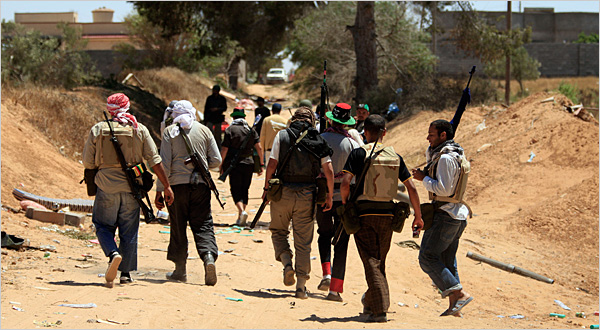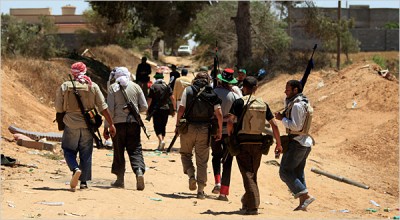What is happening in Libya and around it has highlighted with renewed force the sides of double standard policy of Western countries in geopolitical re-division of the world through managed chaos of overthrowing unwanted regimes in sovereign states. Muammar Gaddafi’s regime was not welcome by the West since the early days of coming to power in 1969, when the Revolutionary Command Council of the Libyan Arab Republic decided to eliminate in Libya all foreign military bases and launched an attack against the foreign capital’s positions in the economy. The most infringed were the interests of the United States and England and that is why it was at that time when the fate of Libya and its leader was predetermined.
The situation worsened in 1980 when Libya undertook the funding of the armed struggle against so called “Western imperialism” all over the world and became involved in organizing several terrorist acts. For this reason, the UN Security Council in 1992 at the request of the U.S.A. and Great Britain imposed the first sanctions against the Jamahiriya.
Libya was “under the hood” until 2003, but after the American occupation of Iraq, Gaddafi confessed and softened his policy. As a result, in 2004, Libya fully freed itself from international sanctions.
Tempers flared again over Libya, when in September 2009 at the 64th Session of the UN General Assembly Gaddafi sharply criticized the policies of major powers, actually accusing them of racism and terrorism. In particular, Gaddafi said that, under the UN Charter, armed forces are used only by the UN decision with the consent of all Member States of the United Nations. However, during the existence of the UN “Big countries ran 64 wars against small countries” and “the UN did nothing to prevent these wars”. Furthermore, Gaddafi said that then U.S. President George Bush and British Prime Minister Tony Blair were personally involved in the execution of Iraqi President Saddam Hussein. Not only the West, but also the UN could no longer condone such public accusations.
Riots in Libya began in mid-February, when under the influence of the crisis in Egypt, Tunisia, the Day of Wrath was held in Libya – the massive anti-government demonstrations, and then turned into an armed confrontation and civil war between supporters and opponents of Gaddafi’s regime.
Today many are asking: Why did this happen? In this case, one of the common justifications of the events are references to distressful situation of popular majority of Libya, the crying stratification of society, the prolonged authoritarian rule, dictatorial style of Gaddafi’s leadership, cronyism and rampant corruption in the society. Arguments would seem persuasive, but for Libya they are unacceptable, because this country does not belong to the poor.
Prior to the events of February GDP per capita calculated at purchasing power parity, in Libya was 13,800 dollars – more than twice as much as in Ukraine, Egypt and Algeria, and 1,5 times more than in Tunisia. The average salary in Libya is 1000 dollars. Prior to the riots every Libyan received as much as he needed to meet his physiological needs: bread and the most important foodstuffs were cheap and available to everybody; transport, electricity, gas for domestic use and fuel are provided to the population at very low prices; all residents are provided with free housing. Children’s pre-school institutions, schools and hospitals meeting the world standards were provided for the population. Lump-sum payment for the newborn is US$ 8,000.
Libya ranked the first in Africa in standards of living and the duration of life – 77 years. In general, human rights, to understand them as the right to a dignified existence, in Libya have been implemented to a much greater extent than in many democratic countries in Europe and Asia. So it is not the distressful situation of the Libyans that was the cause of revolution in this country. Then what?
Some people put first the lack of democracy, Gaddafi’s dictatorial style of rule. But many experts say the main reason for the condemnation of the Libyan regime and its leader are the hydrocarbon reserves estimated by oil at 3 billion tons and by natural gas – 657 billion cubic meters and which were not within the Western capital’s control.
The chaos in the country, already with obvious signs of “managed chaos” were rapidly developed: On February 17, anti-government demonstrations are faked – riots with the use of weapons coming within criminal offences and that the authorities of any state are obliged to suppress. This was done.
However, the international community assessed the authorities? actions inadequate and the UN Security Council at the suggestion of the U.S. already on 26 February (amazing efficiency) adopts a resolution no. 1970 on sanctions against Libya, of which one of the requirements is a ban on shipments of weapons to the country. And right away Washington makes a “small clause” – say, that ban does not apply to the Libyan rebels fighting against Gaddafi’s regime.
On March 17, after it became clear that the “rebels” are losing the “battle” with government troops, the UN Security Council adopts another resolution on Libya – 1973. The new resolution established “a duty of cease-fire”. But it was not specified who must cease fire. Normally, this requirement applies to “all parties to the conflict”. The resolution no. 1973 does not contain such clarification, and this only means a requirement to the country’s authorities. How can in this case the authorities comply with the UN requirement to cease fire in a situation of armed rebellion? Not peaceful demonstration of protest, but a decisive armed rebellion. And does the UN Security Council have the right to so clearly side with the rebels overthrowing the power of one of the member states of the organization?
A particularly dangerous paragraph of the resolution was the entitlement to take “all necessary measures” to protect civilians. Who was granted such a right? Not specified. It is only said that this right is granted to “any interested member states”. In particular, the statement does not preclude the use of military violence, including the bombing from the air. That is, in fact, the resolution of 1973 “authorized” any member state of the UN to use military force against Libya if it deems it necessary. The U.S.A., Great Britain and France deemed it necessary (who would doubt), moreover, they dragged into this adventure the entire North Atlantic alliance and some Arab countries.
Paragraph 6 of Resolution 1973 establishes a ban on air flights over the territory of Libya. And right here Paragraph 7 allows all states, except Libya, “to take all necessary measures” to ensure this ban. That is, the UN Security Council allows anyone to shoot down Libyan planes over Libya’s own territory. But coalition forces went to even greater extremes – they destroy the Libyan planes, not only in air but also on the ground. And not just aircraft, but antiaircraft defences, tanks and other military infrastructure.
At the same time, the UN Security Council resolution does not take into account the interests and rights of people which are loyal to the government or occupying a neutral stance, as if this population does not exist and this is not “people” of Libya, although this population in the country is more than 70 per cent. For example, Paragraph 2 of the Resolution 1973 states that the country authorities should “meet the legitimate demands of the people”. Of which people? Of what laws? There is even no mention of the right of the population (people) of security and protection against armed rebels, who operate beyond the laws of this state.
The Resolution of 1973 was adopted in contradiction to the facts of reality. Thus, the preamble to the resolution states that in the country there is “an escalation of violence”, “tortures” and “mass executions”. However, no evidence is listed herein.
The UN Security Council considers the situation in Libya as an “armed conflict”. However, it is not so. What is happening in Libya is an armed rebellion against legitimate authority, i.e. a crime that must be suppressed by the authorities. Moreover, an armed rebellion with foreign intervention.
Foreign intervention in the domestic affairs of the country by the United States, Egypt, Sudan, Afghanistan and Lebanon were expressed in the form of bribing citizens, delivery and storage of weapons, drugs, propaganda materials. Documents, weapons, instructions were captured and persons who had organized riots were caught with the goods. Their tactics came to the organization of young people’s actions with the mass distribution of drugs and cash (on the average from US$300 to 500 per person). In various messes the crowds of young people were followed by trained fighters in 20-30 people who shot at sentries, etc.
Thus, the UN Security Council resolutions of 1970 and 1973 strengthened positions of the ideologists and organizers of the “managed chaos” and actually armed them with a mandate to overthrow the undesirable for the United States and its allies, Libya’s leader Muammar Gaddafi and allowed them under the banner of “protecting civilians” to commit aggression against the sovereign state and to kill the same civilians.
It is an undeniable fact that the West first organized discord in Libya, armed the so-called opposition, and launched civil war in the country, and then with the whole might of its military forces came out on the side of the rebels with the view of defeating the army of the sovereign state, to overthrow the legitimate power and to sweep into power its appointees. In other words, Libya has become the victim of “managed chaos”. By the way, to believe the White House’s statements, then, curiously enough, they could not understand there what the opposition movement in Libya is like and how it sees the future of the country. Of course, this is the regular slyness of the White House: everything there had been calculated in advance, ahead of time well prepared for military operations (all ships and submarines were deployed in positions of shooting) and its ultimate goals determined the elimination of Gaddafi’s regime.
Today in the United States they do not deny the presence of al-Qaeda members in the ranks of “rebels”. If so, then it turns out that in one place the U.S. destroys al-Qaeda, and in Libya they contribute to the arrival of its representatives to the power? Is it not a classic example of double standards in combating terrorism? In short, everything that is happening in Libya and around it can not be called differently than “managed chaos” by double standards.
From Editorial of Newsfromafrica.org. Published in Exclusive Partnership.























